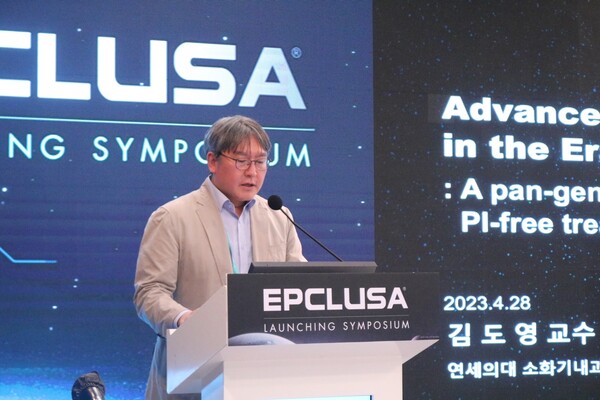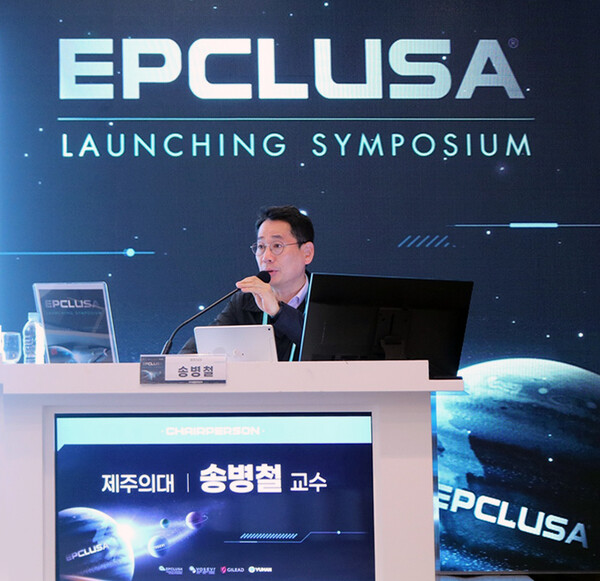Epclusa is not only a pan-genotypic and pan-fibrotic hepatitis C treatment, but also a drug that has shown high efficacy in a variety of patient populations, including non-targeted cirrhosis and chronic kidney disease, said an internal medicine expert at a recent press conference.

Gilead Sciences Korea held a launch symposium on April 28 in Jeju, South Korea, to communicate the clinical value of its oral chronic hepatitis C treatment, Epclusa (ingredient: sofosbuvir/ velpatasvir).
According to the 2021 Hepatitis C Fact Sheet published by the Korean Association for the Study of the Liver, the incidence rate per 100,000 people by region as of 2019 was 13.3 in the Jeju province. This is relatively high compared to other regions with incidence rates of 9.3 in Seoul, 8.2 in Gyeonggi-do, and 12.1 in South Chungcheong province.
In response, Gilead Sciences Korea, which has held launch symposia in major cities across Korea since last year, held its first launch symposium in Jeju to share the latest therapeutic advances in the treatment of hepatitis C and strategies to combat the disease.
Epclusa won domestic insurance coverage in November last year, making it possible to prescribe it in clinical practice. It is the only PI-free treatment that can be prescribed to patients with hepatitis C regardless of their genotype and degree of liver fibrosis, explained Professor Kim Do-young of Internal Medicine at Yonsei University College of Medicine.
Professor Kim added that the Epclusa demonstrated a high SVR of 94-99 percent in the ASTRAL study, as well as high cure rates and safety in clinical studies in Korean patients with hepatitis C. Additionally, a large real-world data study in seven Western countries demonstrated a 98.9 percent cure rate, and a real-world data study in Taiwanese patients with hepatitis C demonstrated a 100 percent cure rate and safety profile in patients with chronic kidney disease as well as non-cirrhotic cirrhosis.
Further clinical value is that various studies have shown consistent and high treatment success rates in a wide range of patient populations, including dialysis patients and drug-experienced patients.

Professor Song Byung-cheol of Gastrointestinal Internal Medicine at Jeju National University Hospital explained, “Epclusa is PI-Free, which means it has a lower rate of potential drug interactions compared to PIs, and simplifies treatment with a single tablet taken once daily for 12 weeks, making it more convenient for patients."
He went on to say that patients with hepatitis C have a wide range of characteristics and comorbidities, so drug interactions and patient adherence are critical for treatment.
Professor Song also shared the clinical value of the retreatment option Vosevi (ingredient: velpatasvir/sofosbuvir/voxilaprevir). Vosevi not only demonstrated a high cure rate of 96 percent in NS5A inhibitor-treated patients with hepatitis C, but also a high cure rate of 98 percent in DAA-treated patients without NS5A inhibitors.
Additional clinical studies in Korean patients with hepatitis C further showed high cure rates and safety and are expected to contribute to improving the treatment environment for hepatitis C in Korea as a retreatment option for patients who have failed conventional treatment.
"We hope that this symposium will help healthcare providers who are dedicated to the fight against hepatitis C in Jeju, Korea, to learn more about the clinical value of Epclusa, and its retreatment option, Vocevi," said Park Kwang-gyu of the Hepatitis Business Division at Gilead Sciences Korea.

